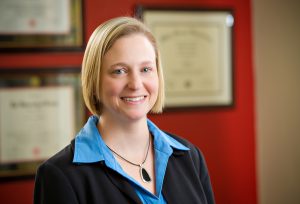Allison McWilliams: Facilitating Reflection
Allison McWilliams, director of mentoring and alumni personal and career development in the Office of Personal and Career Development, writes occasional articles for Inside WFU. This is the fourth for the spring semester. In each, she shares observations and suggestions with faculty and staff from her professional experiences with students.

Effective mentoring relationships incorporate intentional reflection throughout, encouraging mentees to think deeply about their experiences. Facilitating reflective thinking is one of our four Mentor Learning Outcomes and encourages mentors to routinely ask thought-provoking questions that seek deeper meaning and help the mentee to become more self-aware of strengths and growth opportunities. Effective mentoring conversations and relationships are based on the experiential learning model: learning through reflection on action. It is not enough to just have an experience; to learn from it, we must take the time to process the what, so what, and now what questions:
- What? What just happened?
- So what? How do I feel about what just happened? What did I learn from it?
- Now what? What do I do with that new knowledge in the future?
As we approach the end of the academic year, look for opportunities to engage your mentees in reflective conversations about your relationship, about the semester and the year, and about what comes next.
Just as it is important to be intentional about the beginning of any mentoring relationship, it is equally important to be intentional about how you bring it to closure. Don’t just let a mentoring relationship fizzle out. Take some time to reflect on what you have accomplished together, what you each have learned from the relationship, what you each are grateful for, and how you will use the knowledge gained in this relationship in the future. Celebrate what you have done together! And, take the time to acknowledge that your relationship is now shifting to something new.
The end of the academic year, like any ending, can be a source of excitement, relief, anticipation, and worry. This is a great time to talk to students about how they are feeling about this transition, what they have learned over the course of this semester and year, and how they are feeling about what comes next. Some possible questions:
- What was the best part of this semester/year? What was most challenging and why?
- What did you learn about yourself this semester/year? How will you use that new knowledge in the future?
- When you think about what comes next, how are you feeling? Why do you think that is?
Great mentors help us to think deeply about our experiences. Perhaps more importantly, they help us to make connections between past experiences, present learning, and future application.
Categories: University Announcements
